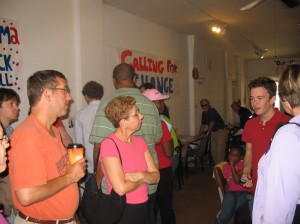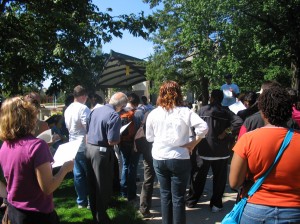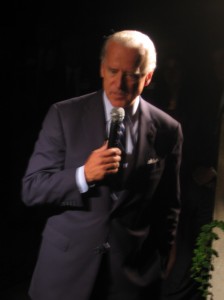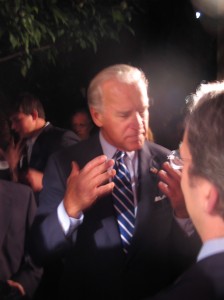 Not much point going door to door in my neighbourhood, so on the 6th I drove up to Kalamazoo with a few friends to see if they could put us to use. Our first stop was campaign headquarters, where we found a huge crowd of volunteers from Illinois being put into service by the efficient Kalamazoo staff. They gave us a choice. We could canvas in a well-to-do suburb, or we could do voter registration on the north side of town, a poorer predominantly African American neighbourhood. We chose the latter, figuring we would at least get a good welcome in an area that was bound to be pro Obama, and we were right. Everywhere we went we were greeted with friendly smiles and little children followed us saying “Obama? Obama?” Almost everyone was already registered and excited to vote, and many had stickers or signs and were doing volunteer work themselves. The majority of new people we registered were ex-offenders who were stunned when we told them they were legally entitled to vote in Michigan. One man sticks out in my memory. No doubt poorly educated — he let his girlfriend fill out the form for him — he was very bright. “We need change,” he said, “Things can’t keep going the way they have been.”
Not much point going door to door in my neighbourhood, so on the 6th I drove up to Kalamazoo with a few friends to see if they could put us to use. Our first stop was campaign headquarters, where we found a huge crowd of volunteers from Illinois being put into service by the efficient Kalamazoo staff. They gave us a choice. We could canvas in a well-to-do suburb, or we could do voter registration on the north side of town, a poorer predominantly African American neighbourhood. We chose the latter, figuring we would at least get a good welcome in an area that was bound to be pro Obama, and we were right. Everywhere we went we were greeted with friendly smiles and little children followed us saying “Obama? Obama?” Almost everyone was already registered and excited to vote, and many had stickers or signs and were doing volunteer work themselves. The majority of new people we registered were ex-offenders who were stunned when we told them they were legally entitled to vote in Michigan. One man sticks out in my memory. No doubt poorly educated — he let his girlfriend fill out the form for him — he was very bright. “We need change,” he said, “Things can’t keep going the way they have been.”
 We were able to return again to Kalamazoo this past Saturday, and this time we went straight to a house in a pretty tree-lined suburb, welcomed by a woman juggling us and her daughter’s soccer game. She told us her husband was in the electrical union but had been laid off, and was delighted to get a position on the Obama campaign. When I donate money, I always think of it going to ads and fliers. It was nice to think that some of it going to people too. Before we left to canvas, we were taught a new way to approach potential supporters. We were not to deluge them with policy positions or debate the issues, but find out what their biggest concerns are and then create an emotional bond of empathy between us before trying to connect them to something in Obama’s life or positions that would address their concerns. Basically, we were going out telling people, “I am like you and Barack is like me.” They had a lovely glossy brochure printed up, heavy on the biography and family photos, designed to show that Obama gets where they come from, that his story is their story. It came in handy with our most memorable visit that day. This was to an elderly woman in a nursing home. We had no idea what to expect, because just before we spoke to her we spoke to the only PUMA I have ever met. “Have you thought about voting for Obama?” we asked. “Is he the…the Black?” she responded. Our hearts sank. We started to talk about his mother and his grandparents in Hawaii, but she paid no attention. “Because I don’t care about any of that,” she said, meaning his race, “We need a change. I think I am going to vote for the Democrat this time.” She told us about growing up in Bridgeport and being a poll worker for the first Mayor Daley, of seeing racism first hand in her neighbourhood and hating it. We opened the brochure and showed her the Christmas card photo of the Obamas. “What a lovely family he has,” she said.
We were able to return again to Kalamazoo this past Saturday, and this time we went straight to a house in a pretty tree-lined suburb, welcomed by a woman juggling us and her daughter’s soccer game. She told us her husband was in the electrical union but had been laid off, and was delighted to get a position on the Obama campaign. When I donate money, I always think of it going to ads and fliers. It was nice to think that some of it going to people too. Before we left to canvas, we were taught a new way to approach potential supporters. We were not to deluge them with policy positions or debate the issues, but find out what their biggest concerns are and then create an emotional bond of empathy between us before trying to connect them to something in Obama’s life or positions that would address their concerns. Basically, we were going out telling people, “I am like you and Barack is like me.” They had a lovely glossy brochure printed up, heavy on the biography and family photos, designed to show that Obama gets where they come from, that his story is their story. It came in handy with our most memorable visit that day. This was to an elderly woman in a nursing home. We had no idea what to expect, because just before we spoke to her we spoke to the only PUMA I have ever met. “Have you thought about voting for Obama?” we asked. “Is he the…the Black?” she responded. Our hearts sank. We started to talk about his mother and his grandparents in Hawaii, but she paid no attention. “Because I don’t care about any of that,” she said, meaning his race, “We need a change. I think I am going to vote for the Democrat this time.” She told us about growing up in Bridgeport and being a poll worker for the first Mayor Daley, of seeing racism first hand in her neighbourhood and hating it. We opened the brochure and showed her the Christmas card photo of the Obamas. “What a lovely family he has,” she said.



